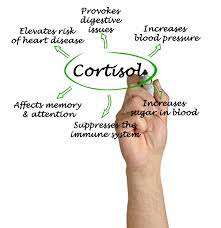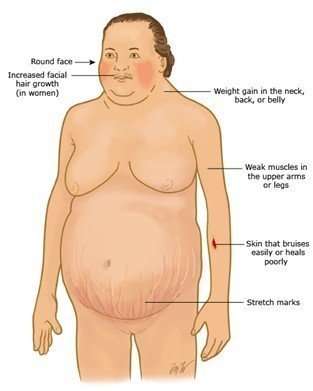Extended periods of stress can have serious effects on your health, including weight gain.
While most people associate obesity with poor diet and lack of exercise, cortisol overload is an often overlooked contributor.
But how exactly does cortisol cause weight gain, and is it responsible for your struggles with obesity?
Let leanandfit.info dig deeper into the science of cortisol and how it could be impacting your weight.
Is Cortisol Overload Fueling Your Obesity Struggles Article Index:
- What is Cortisol Overload?
- The Science Behind Cortisol and Weight Gain
- Symptoms of Cortisol Overload
- Chronic Cortisol Overload and Obesity
- Adrenaline and Cortisol Overload: A Dangerous Combination
- Signs of Cortisol Overload to Watch For
- Cortisol Overload Treatment: Managing Your Stress Hormones
- FAQs on Cortisol Overload and Obesity
- Conclusion: Is Cortisol Overload Fueling Your Obesity Struggles?
What is Cortisol Overload?
Cortisol is a hormone produced by the adrenal glands in response to stress.
It plays an essential role in regulating various body functions, including metabolism, immune response, and even memory formation.
However, when your body experiences prolonged stress, it leads to cortisol overload—a condition where cortisol levels remain elevated for too long.
Normally, cortisol levels fluctuate throughout the day, peaking in the morning and tapering off in the evening.
But when chronic stress kicks in, cortisol stays elevated, wreaking havoc on your body. This can lead to a range of health issues, including weight gain, particularly around the abdomen.

The Science Behind Cortisol and Weight Gain
So how exactly does cortisol contribute to obesity?
Elevated cortisol levels can lead to increased fat storage, particularly around the midsection. This is because cortisol triggers the body to store energy in the form of fat, particularly visceral fat, which is found around vital organs.
Studies have shown that individuals with chronic stress tend to have higher levels of belly fat, even if their overall body weight is normal.
A study published in the Journal of Obesity found that people with higher cortisol levels had a significantly higher BMI (Body Mass Index).
The cortisol overload stress connection is clear: the more cortisol your body produces over time, the more likely you are to struggle with weight gain.
Symptoms of Cortisol Overload
Recognizing symptoms of cortisol overload is crucial for managing its effects on your health and weight.
Common signs include:
- Unexplained weight gain, particularly around the abdomen
- Fatigue, even after getting adequate sleep
- Increased cravings for sugary or high-fat foods
- Muscle weakness or joint pain
- Difficulty sleeping or insomnia
- Irritability and mood swings
- High blood pressure and frequent headaches
The presence of these symptoms suggests your cortisol levels may be consistently high. It’s essential to recognize these early signs before they lead to long-term issues, such as obesity.
Chronic Cortisol Overload and Obesity
When cortisol—the drama queen of hormones—decides to overstay its welcome, your body basically throws a long-term panic party it never asked for. Originally designed to help you outrun saber-toothed tigers or ace a surprise presentation, cortisol is great in short bursts. But when it sticks around like a clingy ex, things go downhill fast.
Living in this constant “fight or flight” mode rewires your body’s priorities. Instead of burning calories efficiently, your metabolism hits the brakes.
Why?
Because cortisol is hoarding energy for a non-existent emergency. Your body starts stockpiling fat—especially around the belly—as if prepping for hibernation. Great for bears, terrible for beach season.
It gets worse. Research from the Endocrine Society shows cortisol loves to mess with your appetite, nudging you toward cookies, chips, and anything ending in “-itos.” Suddenly, that salad doesn’t stand a chance.
Add to that a sluggish metabolism and hormonal sabotage of your satiety signals, and you’ve got a perfect storm for emotional eating, fat gain, and eventual obesity. It’s not just stress eating—it is stress reprogramming your entire fuel system.
So next time life’s chaos has you craving cupcakes, remember: it might not be willpower—it could be cortisol calling the shots.
Adrenaline and Cortisol Overload: A Dangerous Combination
Stress is not just a mental state—it unleashes a biochemical cascade that can alter your metabolism, immune response, and long-term health.
Two primary hormones involved are adrenaline and cortisol. While both are essential for short-term survival, chronic elevation of these hormones leads to dangerous consequences for your body.
Here is how adrenaline and cortisol overload impacts your health, backed by scientific research:
Adrenaline: The Immediate Responder:
Adrenaline, also known as epinephrine, spikes rapidly during acute stress. It mobilizes energy by breaking down glycogen into glucose, increases heart rate, and prepares the body for “fight or flight.” According to research in Frontiers in Endocrinology, adrenaline’s effects are short-lived, ideal for acute stressors—not chronic ones.
Cortisol: The Longer-Term Stress Hormone:
Cortisol sustains the stress response by regulating blood sugar, suppressing inflammation, and aiding energy metabolism. But when cortisol levels stay elevated due to chronic stress leading to fat accumulation—especially visceral fat. A Psychosomatic Medicine study links prolonged cortisol elevation to increased waist circumference and BMI.
Hormonal Tug-of-War:
Initially, adrenaline and cortisol work synergistically, but long-term stress causes cortisol to dominate. This suppresses adrenaline’s effects and shifts the body into a fat-storing, muscle-wasting state, according to The Journal of Clinical Endocrinology & Metabolism.
Increased Risk of Insulin Resistance and Obesity:
Persistent cortisol elevation blunts insulin sensitivity. Research in Diabetes & Metabolism confirms that this hormonal imbalance increases the risk for metabolic syndrome, including Type 2 diabetes and obesity.
Chronic stress is not just emotionally draining—it is metabolically disruptive. When adrenaline and cortisol remain elevated, the body begins to prioritize survival over balance, tipping the scales toward chronic disease.
Signs of Cortisol Overload to Watch For
High cortisol can be a stealthy saboteur. At first, its overload may go unnoticed—but left unchecked, it can stir up serious trouble across your body’s systems.
Here is a closer look at what elevated cortisol might be doing behind the scenes:
-
High blood sugar levels:
Cortisol increases blood glucose by stimulating gluconeogenesis in the liver and reducing insulin sensitivity. This means your body may produce more sugar and become less efficient at storing it, which can eventually contribute to insulin resistance or even prediabetes. -
Reduced immune function:
One of cortisol’s lesser-known jobs is dampening immune responses. When levels remain high, your white blood cells don’t respond as effectively, making you more prone to infections, frequent colds, and slower healing times. -
Digestive issues:
Stress shifts the body into “fight or flight,” diverting resources away from digestion. Chronically elevated cortisol can slow gastrointestinal motility, disturb gut flora, and even compromise the gut lining—leading to bloating, constipation, or discomfort after meals. -
Low libido:
Excess cortisol suppresses reproductive hormones, like testosterone and estrogen. This hormonal imbalance can significantly reduce sexual desire and performance, especially during prolonged periods of stress. -
Difficulty concentrating or memory problems:
Chronic cortisol exposure is linked to structural changes in the brain—especially in the hippocampus, which is vital for memory and focus. As a result, brain fog, forgetfulness, and reduced mental clarity may creep in over time.
If several of these signs resonate with you, it’s wise to assess your stress levels and consider cortisol testing. Simple lifestyle changes—like better sleep, stress management, and physical activity—can make a big difference.
FAQs on Cortisol Overload and Obesity
Q-1: If my labs are “normal,” can cortisol still push weight gain?
A-1: Yes. Chronic stress often flattens the daily curve—slightly higher evenings, slightly lower mornings—without breaching lab cutoffs. That pattern nudges late-night hunger, poorer sleep, and next-day insulin resistance, favoring belly fat. Clues: wired-but-tired at night, mid-section gain despite similar calories, and afternoon energy dips. Quick wins: anchor wake time, get 10–15 minutes of outdoor light early, and move dinner 2–3 hours before bed.
Q-2: Why does stress weight land on the waist, not the hips?
A-2: Visceral fat has more cortisol-activating enzymes (11β-HSD1), locally amplifying cortisol’s signal. That creates a feedback loop: stress → more visceral fat → stronger cortisol effect → easier central storage. You can’t “spot reduce,” but you can mute the loop: prioritize sleep, add two weekly resistance sessions (to protect muscle), and trim ultra-processed snacks that pair stress with fast reward.
Q-3: Can caffeine and alcohol make cortisol-driven cravings worse even if I track calories?
A-3: Often. Late caffeine extends the cortisol tail into the evening; alcohol shortens deep sleep and spikes 3 a.m. wakeups, raising next-day hunger hormones. Net: same calories feel harder to stick to. Guardrails: cap caffeine before noon, keep alcohol rare and with food, and use a “sleep ramp” (screen dim + breathwork + cool room) to restore the cortisol–melatonin handoff.
Q-4: I don’t binge, but I’m not losing—could training be the cortisol culprit?
A-4: Possibly. Back-to-back high-intensity days, fasted intervals plus low sleep, or perpetual calorie cuts elevate stress hormones and suppress NEAT (your spontaneous movement), erasing your deficit. Try a 3-1 rhythm: three hard days per week, one genuinely easy; lift 2–3×/week; and keep one zone-2 cardio session. If steps fall on hard days, set a step floor (e.g., 7–9k) to retain calorie burn.
Q-5: How do prescription steroids differ from stress cortisol for weight gain risk?
A-5: Oral or high-dose injected glucocorticoids deliver sustained, pharmacologic exposure that strongly promotes central fat, muscle loss, and higher glucose—far more potent than lifestyle stress. If you need them, protect the “edges”: protein 1.6–2.2 g/kg/day, two resistance sessions weekly, earlier dinner, and short post-meal walks to blunt glucose. Discuss lowest effective dose and taper plans with your clinician; tiny habit changes during therapy can prevent large weight shifts.

Cortisol Overload Treatment: Managing Your Stress Hormones
Addressing cortisol overload treatment involves a combination of lifestyle changes, stress management techniques, and in some cases, medical interventions.
Here is what worked for me:
- Exercise: Regular physical activity helps lower cortisol levels naturally. Try moderate exercises like yoga, walking, or swimming, which reduce stress without spiking cortisol like intense workouts can.
- Sleep: Lack of sleep can exacerbate cortisol overload. Prioritize 7-9 hours of quality sleep each night, using relaxation techniques to help wind down.
- Diet: A balanced diet rich in whole foods can help regulate cortisol. Avoid excessive caffeine and sugar, which can increase cortisol production. Incorporating foods like dark chocolate, berries, healthy smoothie recipes for weight loss and leafy greens can naturally lower cortisol levels.
- Relaxation Techniques: Practices such as meditation, deep breathing, and mindfulness can significantly reduce cortisol levels. These techniques activate the parasympathetic nervous system, which helps counteract the effects of chronic stress.
In more severe cases of cortisol imbalance, you may need to consult a healthcare professional who can recommend specific treatments, such as medications or therapies that regulate hormone production.
Is Cortisol Overload Fueling Your Obesity Struggles – Conclusive Analysis
In conclusion, cortisol overload can indeed play a significant role in weight gain and obesity. The connection between chronic stress and fat storage is well-documented, making cortisol a major factor in your overall health.
If you have been struggling with unexplained weight gain, fatigue, or cravings for sugary foods, cortisol may be at the root of your problem.
The good news is that cortisol overload symptoms can be managed through a combination of lifestyle changes, stress management, and in some cases, medical treatment.
Recognizing the signs of cortisol overload early on can help you make proactive changes to prevent long-term health issues like obesity.
Reducing stress, getting regular exercise, and adopting a balanced weight management diet are the first steps toward managing cortisol levels and achieving better health.
So, if you are keen to learn how I do a smoothie diet for weight loss
By addressing cortisol overload, you can take control of your weight and feel more in tune with your body.
References: